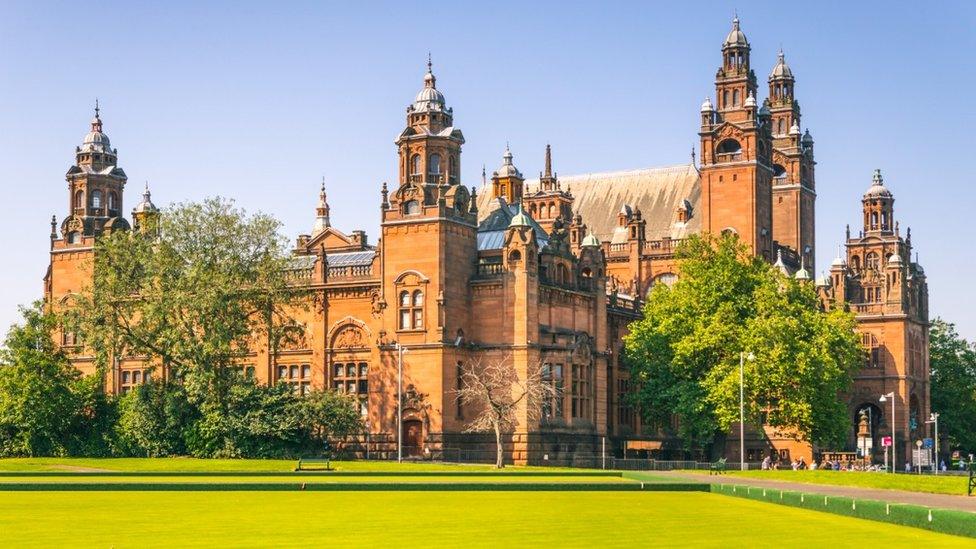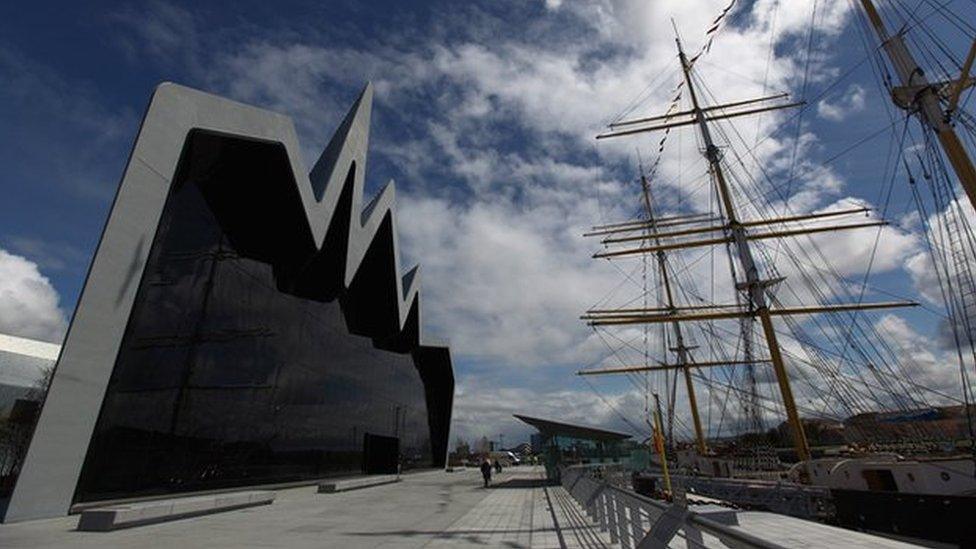Coronavirus: Glasgow Life warns services face uncertain future
- Published
- comments

Kelvingrove Art Gallery and Museum is one of Scotland's most popular visitor attractions
The charity which provides culture, leisure and community learning for Scotland's largest council has warned its services face an uncertain future.
Glasgow Life is preparing a phased approach to reopening venues and will prioritise childcare and education.
But Covid-19 has had a major impact on its finances and nearly 1,000 staff are on furlough.
Last year more than 18 million people used its services but the first quarter of 2020/21 has been largely lost.
Its attractions include Kelvingrove Art Gallery and Museum, the People's Palace, Riverside Museum and the Mitchell Library.
The organisation is aiming to reopen 61 venues and facilities in four phases, between July and October.
'Crisis'
Dr Bridget McConnell, chief executive of Glasgow Life, said: "Without doubt, the effects of this crisis will be felt for some time to come.
"We need to make the correct decisions now, such as prioritising childcare and education, to help maintain vital services in local communities and support the city's economic recovery in the longer-term.
"There are no easy solutions and it's highly unlikely that Glasgow Life will be able to return to anything like its normal service provision in the near future."
Glasgow Life chairman Councillor David McDonald acknowledged demand for its services will be "extremely high" after 14 weeks of lockdown.
He said: "As we prepare for a new way of living and working after coronavirus, our fundamental concern must be to ensure that our facilities are safe for our staff and visitors in the weeks and months ahead."
Mr McDonald also noted that while the UK government's Job Retention Scheme will provide some financial relief, it won't compensate totally for its projected full-year losses, which could run into tens of millions.

The Riverside Museum, which opened in 2013, is also operated by Glasgow Life
Mr McDonald added: "The complete shutdown of Glasgow's museums, libraries and sports venues for more than three months, together with the cancellation of most of the city's events and festivals this year means the millions of pounds of income which supports our services has been wiped out."
He said the charity has had to create "an entirely new set of operating practices" at a time of unprecedented financial and staffing constraints.
Mr McDonald said: "This includes undertaking risk assessments, testing key building systems, installing screens and public sanitiser stations, delivering revised hygiene and safety training to our staff, implementing new booking systems and consulting with our trade unions. It's not a case of just reopening our doors and returning to the way things were.
"Social distancing also means that a large proportion of our venues are unable to reopen safely, and we'll need more staff than before to be working at the venues we do reopen to ensure current restrictions are followed."
Recovery plan
Glasgow Life has already delivered the first phase of its recovery plan with the reopening of 11 golf, tennis and lawn bowls facilities across the city last month.
The charity's second phase, from 15 July, prioritises the reopening of community facilities to support essential childcare,
Phase three will run concurrently with phase two throughout July and will see more of Glasgow Life's office-based and frontline staff returning to work to prepare venues and services for reopening to the public.
Meanwhile, phase four, from August to October, will see continued support for childcare and education provision, greater access for tenants, and the reopening of venues to the public more widely.
This will include some of the city's museums, libraries, arts and sports facilities.


Glasgow Life is an arms-length charitable trust which runs what the layman may think of as a "council service".
The trust, established by Glasgow City Council more than a decade ago, took over the council's galleries, museums, libraries and sports facilities.
The idea was that outside direct council control, there would be more opportunities to generate commercial income which would lead to better value for money for the taxpayer.
Some never liked the idea of moving major assets to an arms-length body although supporters say it works well financially in normal times. But the pandemic has run a coach and horses through this year's business plans. Sporting events, conferences and functions at venues - which have been cancelled since March - are an important source of income.
It is important to stress that there is no threat of any major facility - such as Kelvingrove Museum or the Gallery of Modern Art - closing. Similarly the council has a service agreement with Glasgow Life covering facilities like libraries so any future decision to close one would be for the council.